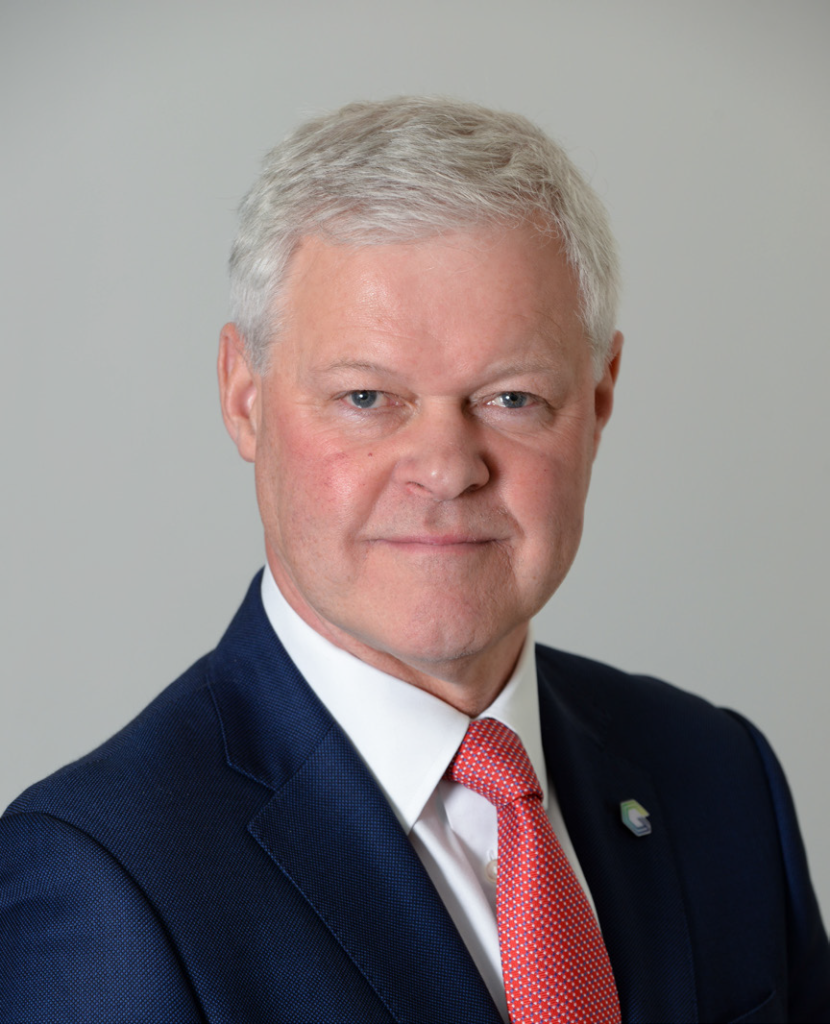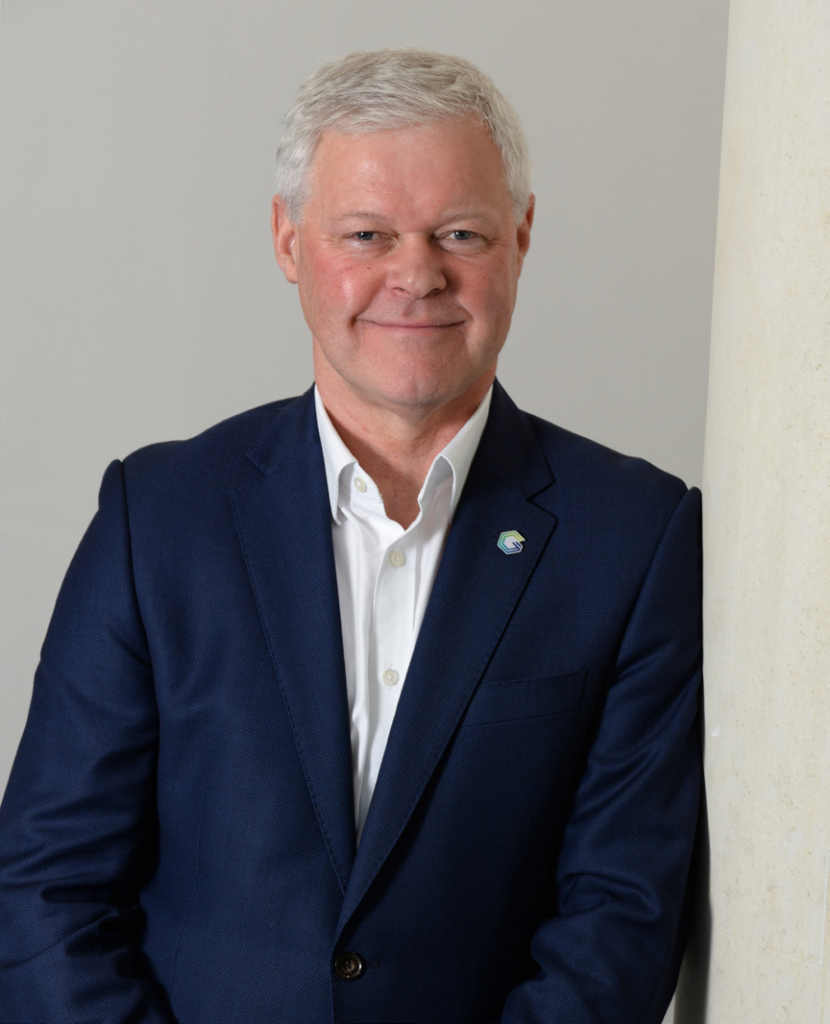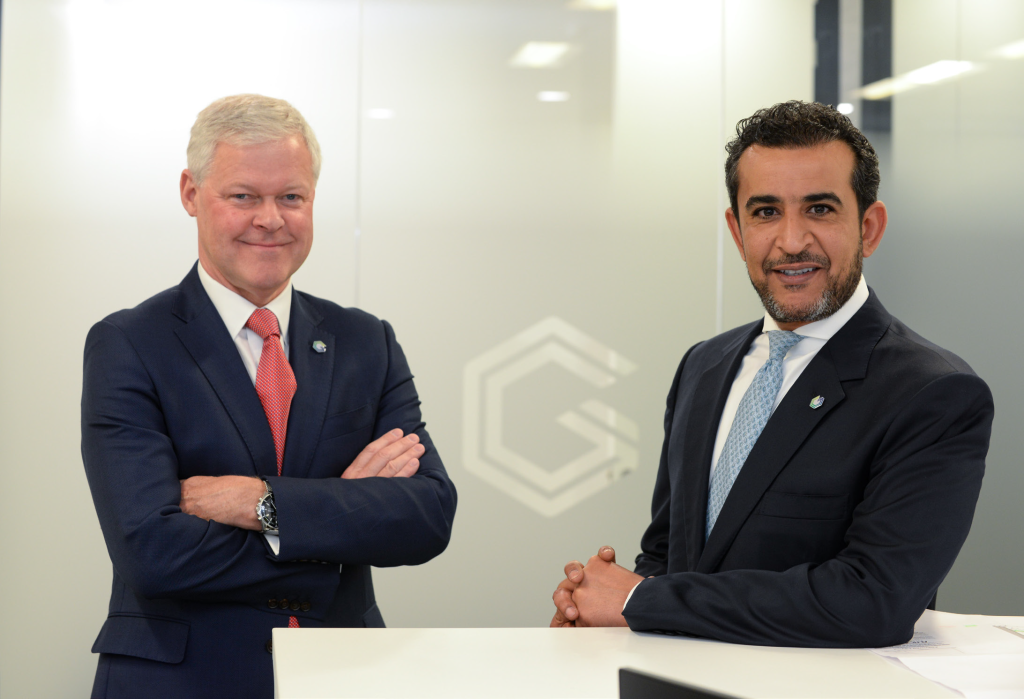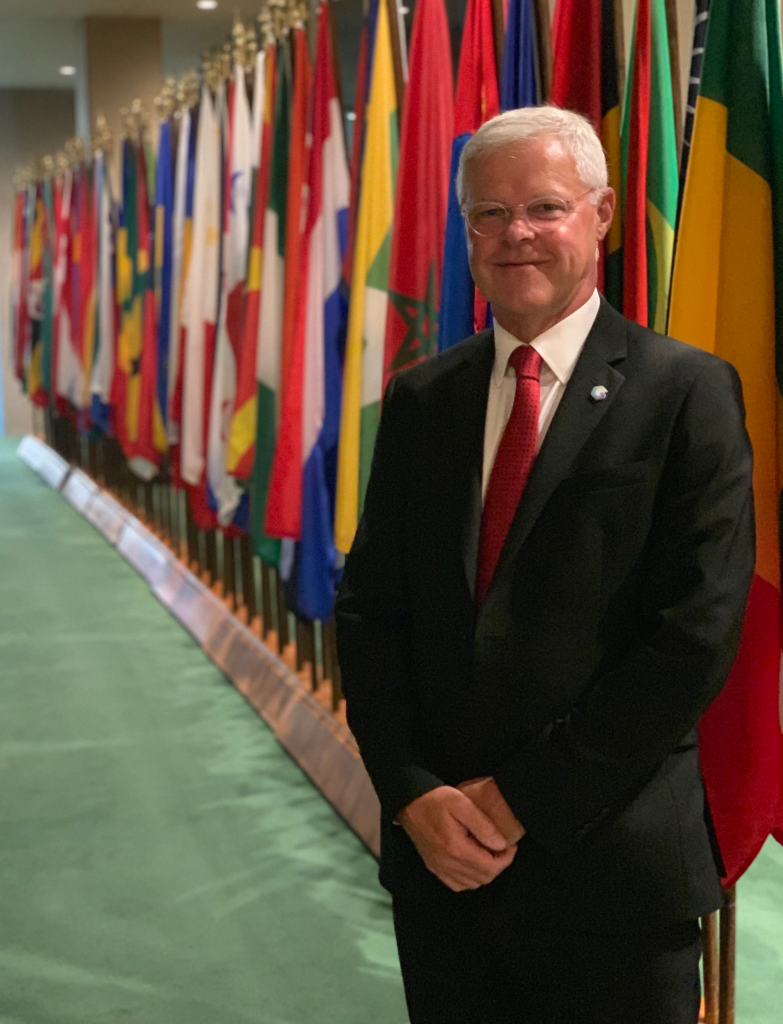CHARLES HARESNAPE – CEO, GATEHOUSE BANK
Charles Haresnape is an exceptionally talented leader in the global Islamic financial services industry. He has brought significant changes to Gatehouse Bank since he took over as its CEO. The bank has successfully launched a new strategy to become a preferred choice by those who are influenced by ethical considerations when choosing a financial partner. Gatehouse Bank is an evolving story of mainstreaming Islamic finance in a market dominated by conventional finance. Charles Haresnape is central to this story. In this exclusive interview, he shares his insights with the stakeholders in Islamic banking and finance.
The UK is recognised as a leading Western centre for Islamic finance and a growing number of providers are now offering Shari’a-compliant products and services to individuals and businesses. In such a competitive market, how does Gatehouse Bank remain ahead of the competition?
In any competitive market, it is important to focus on the customer. We work hard to make our products as accessible to customers as possible, offering individuals straightforward and attractive home finance and savings products. We are also working hard to demystify Shari’a-compliant finance for potential customers, as there are a number of misconceptions about how Islamic finance works.
We believe that it is important to take a human approach to finance and this differentiates us from other providers. We use human underwriting supported by a computer-based approach, so customers never feel they’ve been put in a position where they’ve not been listened to when the computer says ‘no’. We take all the customers’ circumstances into account and come to a reasonable decision. That’s particularly attractive to customers with more complicated income and assets, such as international residents and expats, and I would say that the way we carefully cater to those markets is another strategy that puts us ahead of our competition.
Gatehouse has also agreed on a referral process for at least two Kuwait-based banks for accommodating clients who are looking to finance properties in the UK.
Last year, Gatehouse Bank commissioned the Islamic Finance Consumer Report. Can you share some of the main findings of this report and key lessons for the industry moving forward?
We commissioned the Islamic Finance Consumer Report in response to the lack of insight available in the UK market. The report clearly showed that Islamic finance providers need to do more work to ensure people understand how Shari’a-compliant finance works. The other main takeaway from the report was that more than half of the Muslims in the UK do not currently use Shari’a-compliant finance. This figure is both a challenge and an opportunity — a challenge in that the industry needs to do more to highlight the positive attributes of our services and an opportunity because so many potential Muslim customers are still out there.
Encouragingly, those who have used Shari’a finance in the past typically have positive things to say about it, with 7 in 10 Muslim consumers believing that Islamic finance is dedicated to the interests of the community, and a staggering 85% of existing Islamic finance consumers saying that their experience exceeded their expectations.
We know raising more awareness of our services and products is critical, and the report revealed that friends, family and colleagues are the most common sources of information among those who have never used Islamic finance. We are working on how we can use those connections to get the message out about Shari’a finance products and their benefits.
Gatehouse is committed to providing easy-to-understand information about what Shari’a-compliant finance is and the benefits it can offer. In response to this insight, we produced several animations last year to explain our approach to finance.
We believe that there remains a significant opportunity to further increase both awareness and demand for Shari’a-compliant banking in the UK. We plan to refresh the report this year to track any changes in attitudes.
“Islamic finance providers need to do more work to ensure people understand how Shari’a-compliant finance works.”

“7 in 10 Muslim consumers believe that Islamic finance is dedicated to the interests of the community.”
Gatehouse Bank recently became one of the Founding Signatories of the Principles for Responsible Banking, committing to strategically align its business with the Sustainable Development Goals and the Paris Agreement on Climate Change. What does this mean and why is this important?
Grounded in Shari’a principles, we believe the Bank has a strong ethical compass and a transparent, fair and socially responsible product offering. As a Founding Signatory of the UN Principles for Responsible Banking, we have committed to playing our part in building a sustainable future by being accountable for the social, environmental and economic impact of our activities.
Becoming a Signatory was important to us because the banking sector has such a crucial role to play in the future. The products and services we offer and the industries we provide financial services to have a big influence on the world.
Signing up to the UN Principles was the first step and we have now begun a robust assessment of the Bank’s impact on society, the environment and the wider economy. This assessment will help us set ambitious sustainability targets that will further align our business strategy with society’s goals, as expressed in the United Nation’s Sustainable Development Goals and the Paris Climate Agreement.
To date, we are the only UK Shari’a-compliant bank to be a Signatory to the UN Principles but we would encourage others to sign up. The framework they provide will encourage us to drive our sustainability further each year and take inspired action to create value for our customers, colleagues, shareholders and the wider society.
Gatehouse Bank is known for its award-winning savings products and is also involved in real estate investment. How do you assess the development of the Bank in recent years?
The Bank was established in 2007 with a focus on Commercial Real Estate Investment and has broadened its offering as new opportunities presented themselves.
In the wake of the 2008 financial crisis, the Bank was amongst the first to enter the ‘Build To Rent’ sector, creating desperately needed housing stock for the UK renters. Construction rates had collapsed but we saw beyond the economic malaise and formed a confident long-term view that continues to benefit the country and our investors in equal measure.
The ‘Build To Rent’ sector has grown immensely since then — the total number of completed build-to-rent homes increased by 33% in 20191 and more than 150,000 of them are complete, under construction or in the planning stage. We continue to contribute to improving housing supply, managing two funds which contain over 1,600 rental properties in the North West of England and the Midlands.

“As an ethical bank, Gatehouse will look to support customers that are currently experiencing financial difficulties due to the Coronavirus.
Business and individuals, who are struggling to meet their financing commitments will be offered payment holidays, as for savers who have a fixed term or notice account, we will allow early withdrawals, when they need funds to meet ongoing commitments.
Any customer that is struggling with their finances should contact our customer service teams, who will look to provide as much support as possible.”
The vast majority of build-to-rent investments in the UK focus on multi-apartment towers, which often come with desirable extras include gyms, cinema rooms, concierge and communal lounges to cater to the Millennial market.
However, Gatehouse Bank is focusing on the suburban single-family housing model. These portfolios are situated in locations that have a village feel and less density in areas where this type of family accommodation is in high demand. This has been very successful in the US and we expect it to grow quickly in the UK, too.
In 2017, we decided to significantly extend our offering to individuals. We extended the range of competitive savings products we offered and launched our Buy-to-Let proposition, which has proved to be very popular with the UK, expat and international landlords.
Then in 2018, we introduced our first Home Purchase Plan (HPP) for homebuyers and we have been delighted by the response we have received from customers.
This is how, over time, we’ve developed a whole ecosystem of Shari’a-compliant products able to satisfy our customers’ needs.
Last year Gatehouse Bank won a number of notable awards including Best Islamic Savings Products at the 9th Global Islamic Finance Awards and Best Islamic Home Financing Platform 2019 at the 5th Islamic Retail Banking Awards. How important are these recognitions for the Bank?
It is always incredibly pleasing to be recognised by external organisations, as it suggests we are getting it right. I’m extremely proud of the whole team at Gatehouse Bank and the awards we have received are well-deserved recognition for all their hard work.
Much of the value in these awards comes from their ability to show customers who have not previously considered Gatehouse Bank, or perhaps even Islamic finance, before that what awaits them is a financial services sector that is as mature and professional as any they have dealt with before. Some of the languages might be a little different but, when you boil it down, there are many similarities between Islamic and other forms of banking and ethical standards that are becoming important to a growing number of people.
How has Gatehouse Bank’s business model and strategy changed to adapt to digitalisation, as well as to take advantage of its benefits?
As a bank with no branch network, we invest heavily in technology. We completely rebuilt our website in 2018 to improve customers’ experience, making it more straightforward and intuitive.
We have also invested significant amounts in the systems that underpin our operations, with the development of a Shari’a-compliant home finance platform, to launch our award-winning Home Finance proposition.
The digital investment will remain a key focus as the volume of customers we engage with increases.
What are the key factors of the Western market that affect Islamic banking and finance practice in the UK? How do you integrate these factors in making Islamic banking a universally ethical alternative to conventional banking in the country?
An increasing number of banks in the UK are now focusing on their ethical and sustainable credentials. However, they offer conventional finance, which as a Shari’a-compliant provider, we would say limits their ability to be truly fair and transparent with customers.
Islamic banking is, of course, based on the key principles that money should not, in and of itself, generate more money and risk should be shared. They are central to Gatehouse’s ethical Shari’a-compliant position.
We take our responsibility to society and the environment seriously. Our Shari’a principles ensure our business and operations are conducted in a fair manner and that our products are transparent, fair and socially responsible.
We prohibit the use of our funds to support the arms industry, alcohol, tobacco, adult entertainment and gambling. Our principles encourage trading and enterprise that generates wealth for the benefit of the whole community.
What is your outlook for the future of Islamic finance both in the UK and globally?
We believe the outlook for Islamic finance in the UK is incredibly positive. Shari’a-compliant banks can make their mark by offering specialist finance products to customers poorly served by conventional providers. We should also look to attract more Muslim customers, as many have voiced their concerns in our research over how Shari’a-compliant the industry’s products are.
“Some of the languages might be a little different but, when you boil it down, there are many similarities between Islamic and other forms of banking and ethical standards that are becoming important to a growing number of people.”
We have seen, that there is a large untapped market out there and it is critical that we do more to raise awareness and understanding amongst all consumers, of any religion or none, to Islamic finance and its benefits. This work is already well underway, aided by the regular appearance of Shari’a-compliant products at the top of the best buy tables but we cannot be complacent.
Internationally, commercial Islamic finance is the area seeing the fastest growth and we would expect this to remain the case over the course of the next decade.
What is your personal focus for the next 12-18 months? What change do you hope to implement bank-wide?
Gatehouse will continue to focus on the customer, providing them with attractive products and high-level service, as this will ensure we continue to grow at an impressive rate.
We will also continue to play our part in raising awareness of the benefits of Islamic finance.
Now towards some personal questions. As a CEO, how do you motivate your team? Please share with our readers some of the leadership secrets and your leadership approach.
For me, leadership is primarily about giving direction and motivation. My key mantra is to treat people as you would like to be treated yourself. When you think of a great boss you have worked for and then a not-so-good one, the qualities become obvious.
A number of personalities must have influenced you throughout your career. Whom amongst them you would consider as your greatest mentor or inspiration?
I worked for a senior executive in RBS Group during the early 2000s. His style was straightforward, you knew what was required of you and he covered your back when necessary. I have been heavily influenced by people who have had appalling leadership qualities. I believe that it was a good way to learn what not to do! I feel that insufficient leadership development is given to potential leaders – way before they become leaders.
“We take our responsibility to society and the environment seriously. Our Shari’a principles ensure our business and operations are conducted in a fair manner and that our products are transparent, fair and socially responsible.”
I have an excellent relationship with our Chairman, Fahed Boodai and benefit from his commercial expertise.
What are some of the biggest lessons you have learnt in your career?
Learning to be resilient is a huge benefit. Things often go off track, but being able to see through the “fog” is important. A solution often comes to you, as long as panic does not set in. Not panicking, when others around you may be panicking, is a great quality of a leader.
What excites you about your current role?
The chance to work with great and like-minded people. It is refreshing to move out of big banks and develop a smaller bank, instilling, where sensible, an entrepreneurial spirit.
What would be your advice to the younger generation of Islamic bankers?
Think early about your leadership qualities and seek the support of mentors you see in action. Most leaders will offer their time to someone who shows the right spirit and application.





